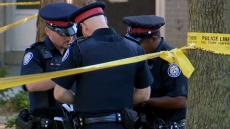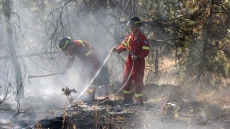Prosecutors say a man found not criminally responsible in a knife attack at a Toronto military recruitment centre should not be allowed to take college classes on his own.
The Crown is appealing a decision by the Ontario Review Board, which last year granted Ayanle Hassan Ali permission to attend Mohawk College unaccompanied while he is detained at a secure Hamilton hospital.
It is also challenging the board's decision to ban Ali from attending known military installations or recruitment centres, arguing he should face a more restrictive condition prohibiting contact with any uniformed military personnel.
"A very careful approach was warranted in addressing the respondent's mental condition, reintegration into society, and other needs, in a way that would not imperil the safety of the public," the Crown argues in its submissions.
"The board, however, only cited the needs of the accused and his reintegration when addressing indirect supervision in the community for educational purposes, and failed to advert to, or give adequate consideration to, the paramount factor of public safety."
The case is set to be heard at the Ontario Court of Appeal in Toronto on Friday.
Ali attacked several uniformed military personnel with a large knife in March 2016 and wounded several people before he was overpowered and subdued.
He was charged with attempted murder, assault causing bodily harm and assault with a weapon, as well as carrying a weapon, all for the benefit of a terrorist group.
Last spring, an Ontario judge ruled that while there is no doubt Ali carried out the attack based on his extremist beliefs, the formation of those beliefs was precipitated by mental illness. What's more, the judge found Ali was not acting on behalf of or for the benefit of a terrorist group.
As a result, Ali was cleared on the terror element of the charges and found not criminally responsible on the lesser included offences.
Months later, Ali appeared before the review board, which annually evaluates the status of anyone found not criminally responsible or unfit to stand trial for criminal offences due to mental illness.
According to documents filed ahead of this week's hearing, the board found Ali constitutes a significant threat to the public and should continue to be detained at a Hamilton hospital.
However, it also granted Ali privileges to travel through the hospital and grounds, first with staff, then progressing to an approved companion, then under "indirect supervision," which means being unaccompanied.
The board said Ali could then follow a similar progression into the community for education purposes, namely to go across the street to Mohawk College.
Prosecutors said the board's decision was "unreasonable" given that it was Ali's first review and he has no track record with such privileges.
While Ali has been compliant with his medication and has generally followed the rules in his highly restricted hospital ward, that is not the same as having "unsupervised access" to the college, the Crown said.
It noted that since military personnel could be at the college, the board should have imposed a condition barring Ali from contacting any of them, particularly in light of his "residual symptoms."
Ali's psychiatrist testified at the board hearing that his patient continued to take his medication and his mental status was improving, the documents said.
He testified Ali accepts that he has schizophrenia and knows the symptoms of his illness, except for residual thoughts that he is being monitored by the Canadian government, which he is not convinced stems from his illness.
The doctor added Ali still has concerns about the Canadian government's actions overseas towards Muslims but has not expressed any more desire to achieve martyrdom by attacking Canadians.
It appears Ali's illness first manifested in 2003 when his mother, who also has schizophrenia, was in a state of psychosis, the documents said. He began experiencing obsessions and compulsions as a teen as well as intrusive chatter in his head, they said.
His parents then separated and Ali started living with his mother, who called him several times a day accusing him of poisoning her and warning that he was in danger, the documents said.
His sense that the government was monitoring him intensified over the years and caused him to quit his job, the documents said. He stayed home with his mother, who was not well, in the weeks leading up to the attack.
Ali hoped to leave the country with his mother and decided to get his passport, they said. It was while attending the passport office that he discovered the military recruitment centre and "began to think that it was the place he would achieve martyrdom."


